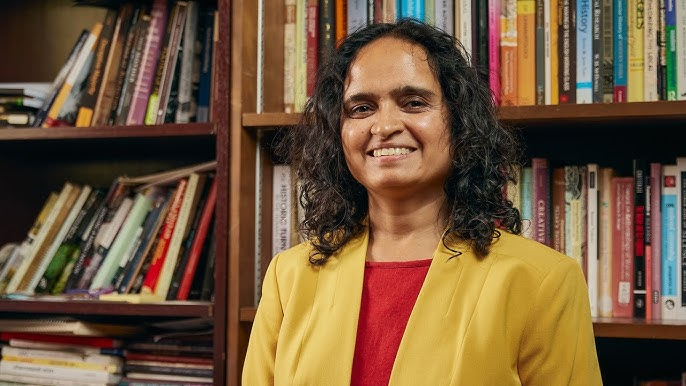Shailaja Paik, a distinguished historian of Indian origin, has been awarded a USD 800,000 grant by the MacArthur Foundation for her groundbreaking research on Dalit studies, particularly for “exploring the intersection of caste, gender, and sexuality in modern India through the lives of Dalit women.”
The MacArthur Fellowship, often called the “Genius Grant,” recognizes extraordinarily talented individuals and invests in their potential through this no-strings-attached award.
Shailaja Paik’s Pioneering Research on Dalit Women
Paik’s work centers around Dalit women, who belong to the Dalit community—the lowest class in India’s traditional Hindu social hierarchy.
Her research delves deeply into the lived experiences of these women, documenting their struggles against caste, gender, and sexuality-based discrimination.
By focusing on this intersectionality, Paik reveals how these forces of oppression have historically denied Dalit women dignity and personhood.
The MacArthur Foundation acknowledged Paik’s work for its significant contribution to understanding the mechanisms of caste domination and oppression.
“Through her focus on the multifaceted experiences of Dalit women, Paik elucidates the enduring nature of caste discrimination and the forces that perpetuate untouchability,” the foundation said in a statement.
Her work incorporates extensive archival research and ethnographic fieldwork, including interviews with contemporary Dalit women, to build a comprehensive new archive.
Recognition as a MacArthur Fellow
Paik is among 22 individuals selected as MacArthur Fellows in 2024, an honor that comes with the financial award intended to encourage continued creative and intellectual exploration.
Since 2010, Paik has been affiliated with the University of Cincinnati, where she serves as the Charles Phelps Taft Distinguished Research Professor of History.
She is also an affiliate faculty member in Women’s, Gender, and Sexuality Studies and Asian Studies.
Reacting to the award, Paik expressed her excitement to UC News: “I’m ecstatic! I’m happy to have the ‘big genius’ feather in my cap, now.”
The fellowship is widely regarded as one of the most prestigious recognitions of intellectual achievement, with University of Cincinnati President Neville G. Pinto describing it as “one of the highest recognitions for intellectual accomplishment and impact that a faculty member can win globally.”

The Legacy of Shailaja Paik
Born into a Marathi-speaking Dalit family in Maharashtra, India, Paik’s personal background and academic journey have significantly influenced her work.
She earned her BA and MA degrees from the University of Pune before pursuing her PhD at the University of Warwick in 2007.
Over the years, Paik has held prestigious academic positions, including a visiting assistant professorship at Union College and postdoctoral work at Yale University.
Her scholarship has been widely published in academic journals, including the Journal of South Asian Studies, Gender and History, Journal of Women’s History, and Indian Journal of Gender Studies, among others.
Paik’s research draws from historical archives and personal narratives to analyze how caste inequality perpetuates social stigmatization and exploitation.
Paik’s work goes beyond academic inquiry; it is a form of activism. As she stated, “Centering the most oppressed Dalit women provides a more comprehensive understanding of oppression, dehumanization, and injustice and revitalizes anti-caste, anti-patriarchal, and anti-race work.”
Her research highlights the resilience and agency of Dalit women, showing how they continually resist and rise against oppressive systems.
She contributes to “new global histories of our collective humanity” by foregrounding their experiences of resistance and resilience.
The MacArthur Foundation’s Support for Social Justice
The MacArthur Fellowship’s recognition of Paik is part of the foundation’s broader mission to support scholars and activists engaged in social justice work.
The grant, often referred to as an “investment in potential,” will allow Paik to expand her research and further explore the nuanced intersections of caste, gender, and sexuality in India.
Paik’s work offers not only an academic framework for understanding Dalit oppression but also actionable insights for activism and policy reform.
The insights drawn from her research on the resilience of Dalit women have the potential to influence both national and international conversations on human rights, social justice, and the fight against systemic discrimination.
Positive Impact of Shailiaja’s Achievement on the South Asian Community
By earning such a prestigious international recognition for her work on Dalit women, Paik is amplifying the voices of those historically oppressed by the caste system.
Her research, which explores the intersection of caste, gender, and sexuality, challenges the mainstream narrative of South Asian history and forces a reexamination of how caste discrimination continues to affect millions.
This creates a platform for Dalit women and other marginalized communities to be seen, heard, and acknowledged both in academic circles and in wider public discussions.
The positive impact of Paik’s work extends beyond just the academic realm, it empowers Dalit communities by validating their experiences and showing them that their struggles are worthy of global recognition.
It helps foster a sense of pride and resilience within the South Asian community by addressing and dismantling centuries-old structures of inequality.
Additionally, Paik’s recognition inspires future generations of South Asian scholars, activists, and students to pursue research and activism centered on social justice.
Her success encourages them to explore difficult and often ignored subjects, such as caste-based oppression, with the confidence that their work can create tangible change and gain international attention.
Moreover, Paik’s work connects South Asian struggles for equality with global movements against racism, sexism, and other forms of systemic discrimination.
By highlighting the intersectionality of caste, gender, and sexuality, she builds bridges between South Asian issues and broader global human rights discourses.
This helps bring greater visibility to South Asian struggles on the international stage, fostering solidarity with other marginalized communities around the world.



